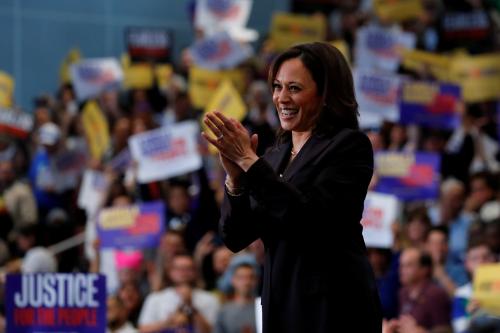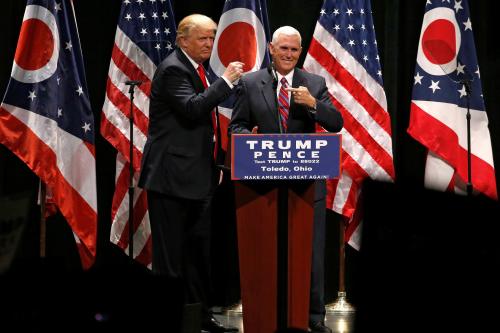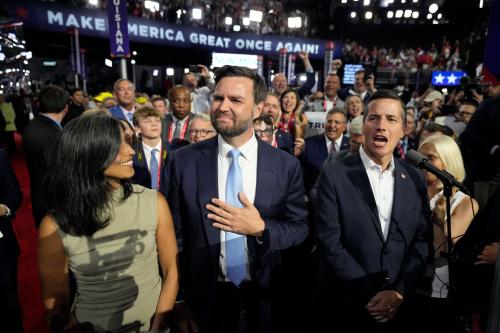On Wednesday night the Republican Convention heard from the polar opposite of Donald Trump when their vice presidential nominee accepted the nomination. He gave new meaning to the term “balancing the ticket.” As Indiana Governor Mike Pence spoke it became clear that he is the un-Trump. He is a modest mid-westerner. Trump is a flamboyant New Yorker. Pence’s speech last night was charmingly self-deprecating, a real change after months of listening to Trump’s egomaniacal speeches. He has been married 31 years and his wife has the poise and beauty of the average middle-aged woman in America. Trump’s wife is his third wife and looks like we all wish we could look but don’t. Pence’s son is an active duty Marine; none of the Trump men served in the military. Pence began his speech with a brilliantly straightforward and elegant statement—“I’m a Christian, a conservative and a Republican in that order.” Trump’s bona fides on each of those have been called into question.
The parameters for who should be the vice president have changed dramatically in recent decades. For much of American history vice presidents have been understudies; often despised by the president they served, used by political parties, derided by journalists, and ridiculed by the public—in fact, the last vice president from Indiana (Dan Quayle) was mocked widely by media. That’s because, from the beginning of the 19th century until the very end of the 20th century, most vice presidents were chosen to “balance” the ticket. The balance in question could be geographic—a northern presidential candidate like John F. Kennedy of Massachusetts picks a southerner like Lyndon B. Johnson. Or it could be ideological—a middle of the road Republican such as Senator Bob Dole, picks conservative Congressman Jack Kemp in order to woo the tax-cutting supply side faction of the Republican Party.
Not surprisingly, when these “balanced” tickets got elected the two men did not always get along. All too often their relationship ran the gamut from cold and distantly cordial to outright hostile. Vice presidents were cut out of the action, relegated to trivial chores or dispatched to attend funerals in foreign countries. If the criteria for selection were “balance” it all but guaranteed that the office itself would be pretty lame. Formerly powerful Senators writhed under the constraints once in office. Harry Truman was kept so out of the loop that he didn’t even know about the project to build the atom bomb until President Roosevelt died and he became president. As vice president, former Senate Majority Leader Lyndon Johnson found himself suffering one slight after another at the hands of Bobby Kennedy, Attorney General and kid brother of the president.
The “balance” option went out the window when Bill Clinton selected Senator Al Gore as his running mate in 1992. Gore didn’t balance Clinton at all, he echoed him; a young moderate southerner. Consequently, the two had a terrific working relationship for most of their two terms. In choosing their running mates, Bush and Obama followed the same rationale as did Clinton. They did not choose vice presidents for either ideological or geographic “balance.” Dick Cheney hailed from George W. Bush’s home state until he moved to Wyoming to comport with the Constitutional obligations for a presidential ticket. Wyoming has 3 electoral votes and is reliably Republican. Delaware, Vice President Biden’s home state also has 3 electoral votes and is reliably Democratic. In both instances, our two most recent presidents chose men who were compatible with them and who could be trusted, therefore, to help them with a job that has gotten bigger and bigger. In both cases, as with the GOP ticket in 2016, the VP was added to add gravitas to a standard-bearer seen as having limited national government experience.
In that sense Pence is a wise choice, he has extensive legislative and executive experience. So if the Trump-Pence ticket wins will Trump entrust Pence with major policy responsibilities, as he suggested he would to Governor Kasich, had Kasich accepted his offer? Pence has the experience in public office that Trump lacks—but would a President Trump let him into the inner circle and take advantage of that? Or would the personal differences between the two lead to one misunderstanding after another?
We will soon know. As they campaign together we’ll see if the chemistry, now obviously absent from their arranged marriage, develops or not. “Balanced tickets” often didn’t get along. This ticket is balanced most strongly on the personal level. It could work, or poor Governor Pence, who comes off as a truly decent guy, could find himself living the words of Franklin Roosevelt’s first vice president, John Nance Garner, “It was not worth a quart of warm spit.
Elaine C. Kamarck is a Senior Fellow at the Brookings Institution and author of Primary Politics: Everything You Need to Know about How America Nominates Its Presidential Candidates. She is a superdelegate to the Democratic convention.
The Brookings Institution is committed to quality, independence, and impact.
We are supported by a diverse array of funders. In line with our values and policies, each Brookings publication represents the sole views of its author(s).







Commentary
Obvious differences between Trump and Pence could derail the ticket
July 21, 2016